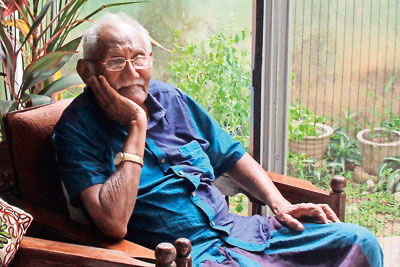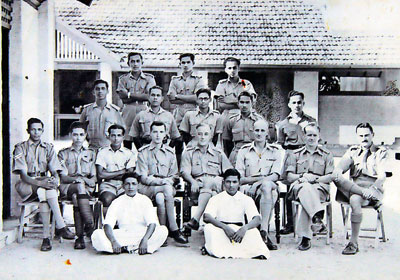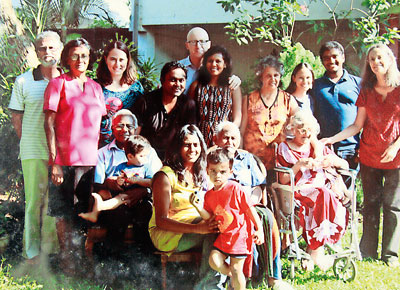Through the mist of time and hills of tea country
Gilbert Theophilus David Navamanie is a child of camellia sinensis. Almost unwittingly, he was to spend most of his 100 years in upcountry tea estates, first as the progeny of a chief clerk, and then as a chief clerk himself. It was in the golden valleys of Bogawantalawa, Bandarawela and Agrapatna- classic tea country that he did his bit to put those misty hills and the golden brew they yielded on the map.
Having celebrated a charmed centenary (with just slight diabetes and a few complaints) on Thursday, December 31, Mr. Navamanie is still dapper, just as he would have been on Victory Day in 1945, when he, though only a young private in the British Army had the privilege to watch, from the main dais, many foreign contingents marching before Lord Mountbatten of Burma at the Galle Face parade.

Gilbert Navamanie: A centenarian who can recall a full life. Pix by M.A. Pushpa Kumara
Seated in his Moratuwa house next to a glittering Christmas tree and the pudding being mixed on a table, his cat Bullet darting in and out of his legs, Mr. Navamanie can reach any obscure nook of his well-archived memory. Ranjana, his youngest daughter, just has to prompt him for the recollections to begin.
The Navamanies, part of the 19th Century tea exodus were from South India, a middle class Madras clan. Gilbert’s parents came over to Ceylon to work in estate administration. The young couple, Manickam and Daisy were at High Forest estate, Kandapola, shrouded in the cold wilderness, snug but isolated where leopards would come prowling to hunt estate dogs at night.
Gilbert and siblings schooled in Madras in the school where their grandfather was headmaster and he remembers the long passage of coming over to Ceylon for the holidays. Leaving the sultry dog days in Madras, they travelled in small ships from Dhanuskodi to Talaimannar, from there taking the train to Nanu Oya. From Nanu Oya, the bullock carts carried them swaying up those winding roads with bends and the dark montane forest looming around them. When the bullocks had to be rested (it was an eight-hour climb) the carters would unpack a generous picnic for the children. At High Forest Daisy and Manickam would wait with high tea (cucumber sandwiches to kalu dodol and patties), blazing fires and the promise of many a ramble down dark glades.
The schools the seven children attended were the Wesleyan Methodist School and Pope Memorial High School, Sawyerpuram.
In 1931 at 11, Gilbert fell ill with typhoid. He would fitfully drift in and out of consciousness for three months. When he recovered, it was to find that his grandfather had died of pneumonia and that coffins had been ordered for both of them.
The greatest regret of Gilbert’s life remains having to leave university at year one, his dreams of being a doctor in shambles when his father lost his job.
Medicine being ruled out, it was halfheartedly that Gilbert took up the ‘family profession’- as a clerk at Nayabedde, which with its salubrious air, green hills and cosy bungalows was soon to become his favourite place anywhere. He soon proved his mettle displaying that dexterity when his pen would move down the column without a pause as he did additions and he could carry on a conversation while typing a letter.
Nonetheless there was an interlude in the Nayabedde spell when he decided to serve the country. The Easter Sunday Raid (1942) had grazed Colombo badly making the dangers of the Second World War to the island real and imminent.

War years: With the Colombo Medical Corps staff serving at the Indian General Hospital located at HFC- Mr. Navamanie (in glasses) is seen standing in the second row
Gilbert joined the Ceylon Medical Corps (CMC) of the British Army. He was assigned to the typing pool of the British wing in the Indian General Hospital which had taken over Holy Family Convent, Bambalapitiya. He impressed the chief clerk Major A. J. Z. Navaratne by typing 200 letters in record time and was allowed to answer all the letters himself.
The British while in the army were ‘friendly and nice’, probably, he says, because the CMC was mostly doctors. A British sergeant, handling the clerical work of the RAF, was given to shivering whenever he heard an aircraft overhead so Gilbert was apportioned his work as well.
He also had a brush with the Commander of the Ceylon Army, Roderick Sinclair- the Earl of Caithness. The chief of the Sinclair Clan, was so gargantuan that he had to be accommodated on two beds – “one for his body and one for his feet”. Gilbert was given the task of monitoring the earl’s breathing. He was personally thanked later by the booming giant who Gilbert says towered over the late D. S. Senanayake.
It was after the war that he ‘gatecrashed’ the dais at Victory Day when his erstwhile senior Major Navaratne was commentating to get a bird’s eye view of the historic parade.
The Colombo Gilbert remembers was a shady, quiet place with flamboyant and other avenue trees.
While at the army, everyone was given ‘compulsory’ leave of one week three times a year topped by rations including 14 lb. of corned beef with rice, eggs and other necessities. The monthly pay was 40 Rupees, and other rationed items could be had for free in the NAAFY shops on the barracks.
Following the war Mr. Navamanie was back in his beloved Nayabedde. In 1947, he married Therese Violet Canagasabey, his cousin’s girlfriend’s sister he met inadvertently at ‘the pictures’. It must have been the Regal or the New Olympia in Colombo and the movie’s title is hazy. The family joke is that he was so impressed by Therese, nothing else registered and the elephant’s memory failed for once. Ranjana adds that Gilbert’s best man was his friend from the army Victor Wanigaratne.

A family gathering in 2015: Missing out on a birthday reunion this year due to COVID
After the ’47 nuptials, at St. Anthony’s Cathedral Katugastota, Gilbert and Therese had had three children- Ronald, Indira and Ranjana.
Now also grandfather to four and great-grandfather to three, Mr. Navamanie still enjoys doing the Sunday crosswords and Sudoku and tends to himself, up to keeping his moustache spruce.
Longevity seems to run in the family with three siblings of Gilbert in their 90s. Abstinence has its benefits as must long walks in the hills.
“And they drank tea- at least eight to nine times a day,” says Ranjana, “very strong tea” as Gilbert remembers an old barrack joke.
“Every Thursday there was a drinking party. I’ll go to the table first, pour myself ginger beer (and pretend it’s alcohol), then they will come and say, “adoh bugger, don’t drink plain, add some ginger beer” and pour more ginger beer to the glass.”
He has many tales to share when surrounded by his grandchildren and his many nephews and nieces.
Unfortunately COVID has been harsh on someone who relishes laughter, chatter and youthful high spirits around him. As Marsha, his American daughter-in-law says, the family spread around the globe will miss the centenary celebrations dearly as they will the twinkling eyes of a gentle, soft-spoken man who once could not sleep for four nights because he accepted the army rations of cigarettes for a brother-in-law who pleaded for them. The good do live long.


